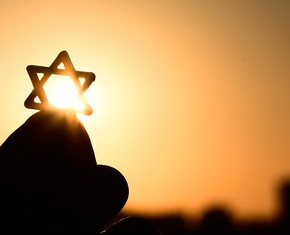The views expressed in our content reflect individual perspectives and do not represent the authoritative views of the Baha'i Faith.
How, since its founding almost two centuries ago, has the Baha’i Faith managed to retain its global unity? What has prevented it from splitting into various denominations like so many other religions?
The overall principle, contract, and commitment that holds the Baha’i Faith together and prevents it from disunity and dissension is called the Covenant. The Baha’i Book of the Covenant, also known as the “Crimson Book,” established the “Centre of the Covenant.” Let’s take a brief look at what that all means, and see if we can answer the following questions.
To whom does this exalted title – The Centre of the Covenant – refer? Why is this important to Baha’is? What is its broader significance for the world at large? What does the Baha’i Covenant hold for the future? How is the Baha’i “Covenant” both a principle and a prophecy?
RELATED: Finding the Ark of the Covenant
The short answer is that the Baha’i Covenant, in principle and in practice, is what holds the Baha’i community together. The Baha’i Faith today is a worldwide Faith community — a global body united in principle and by design. The lynchpin of its unified structure is the “Covenant” — a clear line of historical, spiritual, and administrative leadership, briefly described at Bahai.org:
The Baha’i Faith began with the mission entrusted by God to two Divine Messengers — the Bab and Baha’u’llah. Today, the distinctive unity of the Faith They founded stems from explicit instructions given by Baha’u’llah that have assured the continuity of guidance following His passing. This line of succession, referred to as the Covenant, went from Baha’u’llah to His Son Abdu’l-Baha, and then from Abdu’l-Baha to His grandson, Shoghi Effendi, and the Universal House of Justice, ordained by Baha’u’llah. A Baha’i accepts the divine authority of the Bab and Baha’u’llah and of these appointed successors.
RELATED: The Day of the Covenant: A Season for Remembering Abdu’l-Baha
Abdu’l-Baha singled out the Baha’i Covenant as a special teaching — one unprecedented and therefore unparalleled in the history of religions – “not given by any of the Prophets of the past.” This teaching states that the Baha’i Covenant protects Baha’i unity, as Abdu’l-Baha explained:
As to the most Great Characteristic, — and it is a specific teaching of the Revelation of [Baha’u’llah] and not given by any of the Prophets of the past, — it is the teaching concerning The Center of The Covenant. By giving the teaching concerning The Centre of The Covenant [Baha’u’llah] made provision against all kinds of differences, so that no man should be able to create a new sect. To guard against that … He entered into a Covenant with all the people of the world, indicating the Person or the Interpreter of His teachings, so that no man should be able to say that he explains a certain teaching in this way, and thus create a sect revolving around his individual understanding of a part of the teachings. Thus the “Book of the Covenant” and the Testament of [Baha’u’llah] is the means of preventing such a possibility …
So, clearly, the “Centre of The Covenant” is Abdu’l-Baha. Here, Abdu’l-Baha explicitly cites a specific passage from Baha’u’llah in the “Book of the Covenant,” which proclaims:
Consider that which We have revealed in Our Most Holy Book: “When the ocean of My presence hath ebbed and the Book of My Revelation is ended, turn your faces towards Him Whom God hath purposed, Who hath branched from this Ancient Root.” The object of this sacred verse is none except the Most Mighty Branch [Abdu’l‑Baha]. Thus have We graciously revealed unto you Our potent Will, and I am verily the Gracious, the All-Bountiful.
In this key passage from the Book of the Covenant, Baha’u’llah explicitly names, appoints, and designates his eldest son, Abdu’l-Baha, as his successor and thus the head of the Baha’i community, as Abdu’l-Baha explained:
In the [Most Holy Book], unto which everyone must turn, and in the [Book of the Covenant], which is the last Tablet revealed by [Baha’u’llah] and recorded by the Supreme Pen, He addresseth everyone in clear and explicit terms … to turn unto the Centre of the Covenant. … In the [Book of the Covenant], He testifieth in unmistakable terms that the object of this verse is none other than the Centre of the Covenant.
The ascension of Baha’u’llah took place 29 on May 29, 1892. Nine days later, Baha’u’llah’s Book of the Covenant was read aloud and Abdu’l-Baha was pronounced the successor to Baha’u’llah. Abdu’l-Baha’s leadership of the Baha’i world lasted 29 years, from 1892 to his passing in 1921.
RELATED: When a Prophet Passes Away: The Ascension of Baha’u’llah
Baha’u’llah’s Book of the Covenant is also referred to in the Baha’i writings as the Crimson Book. This is what Shoghi Effendi, the Guardian of the Baha’i Faith and Abdu’l-Baha’s successor, wrote about the Crimson Book:
Written entirely in [Baha’u’llah’s] own hand; unsealed, on the ninth day after His ascension in the presence of nine witnesses chosen from amongst His companions and members of His Family; read subsequently, on the afternoon of that same day, before a large company assembled in His Most Holy Tomb, including His sons, some of the Bab’s kinsmen, pilgrims and resident believers, this unique and epoch-making Document, designated by Baha’u’llah as His “Most Great Tablet,” and alluded to by Him as the “Crimson Book” in His “Epistle to the Son of the Wolf,” can find no parallel in the Scriptures of any previous Dispensation, not excluding that of the Bab Himself. For nowhere in the books pertaining to any of the world’s religious systems, not even among the writings of the Author of the Babi Revelation, do we find any single document establishing a Covenant endowed with an authority comparable to the Covenant which Baha’u’llah had Himself instituted.
Here is Shoghi Effendi’s prophecy connected with the power and potency of the Crimson Book:
And now to crown the inestimable honors, privileges and benefits showered upon Him, in ever increasing abundance, throughout the forty years of His Father’s ministry in Baghdad, in Adrianople and in Akka, He had been elevated to the high office of Center of Baha’u’llah’s Covenant, and been made the successor of the Manifestation of God Himself — a position that was to empower Him to impart an extraordinary impetus to the international expansion of His Father’s Faith, to amplify its doctrine, to beat down every barrier that would obstruct its march, and to call into being, and delineate the features of, its Administrative Order, the Child of the Covenant, and the Harbinger of that World Order whose establishment must needs signalize the advent of the Golden Age of the Baha’i Dispensation.
This unique, distinctive Baha’i teaching, according to Abdu’l-Baha, “is the light of the world:”
The lamp of the Covenant is the light of the world, and the words traced by the Pen of the Most High a limitless ocean. The Lord, the All-Glorified, hath, beneath the shade of the [Tree of Life], made a new Covenant and established a great Testament … Hath such a Covenant been established in any previous Dispensation, age, period or century? Hath such a Testament, set down by the Pen of the Most High, ever been witnessed? No, by God!
















Comments
Sign in or create an account
Continue with Googleor